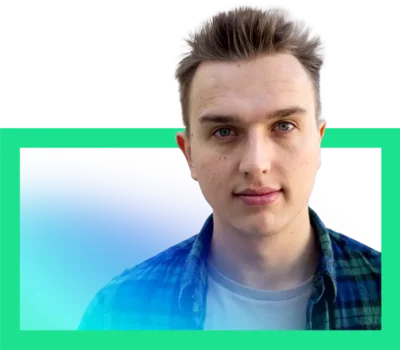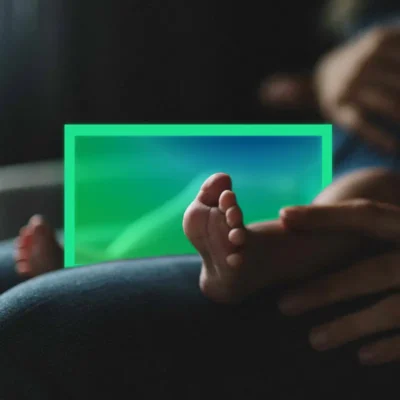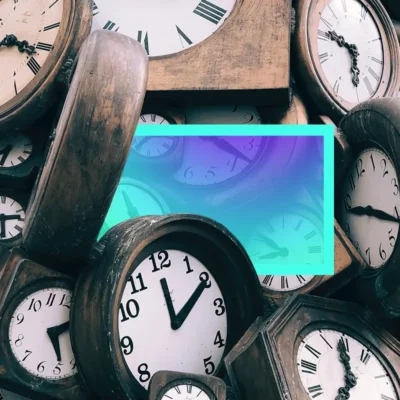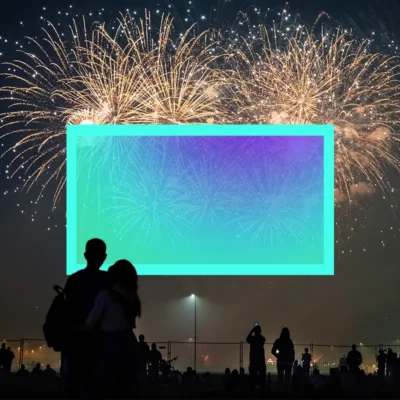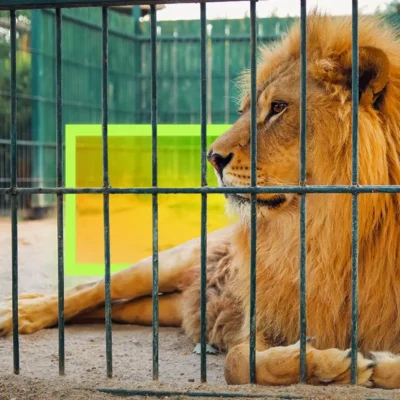Dancing on my own
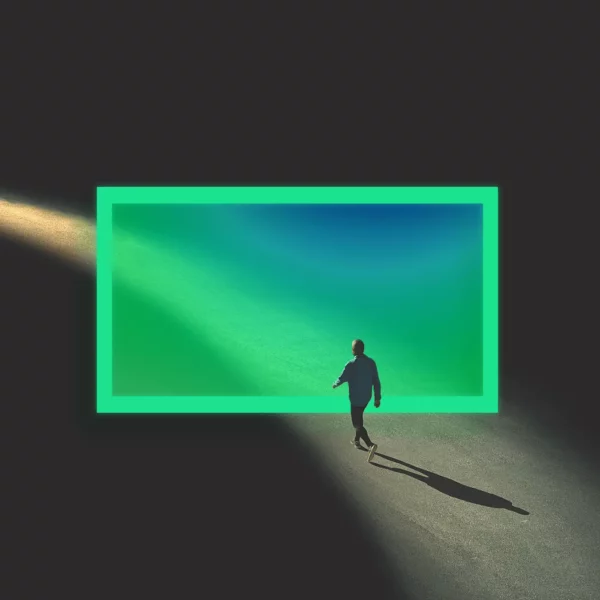
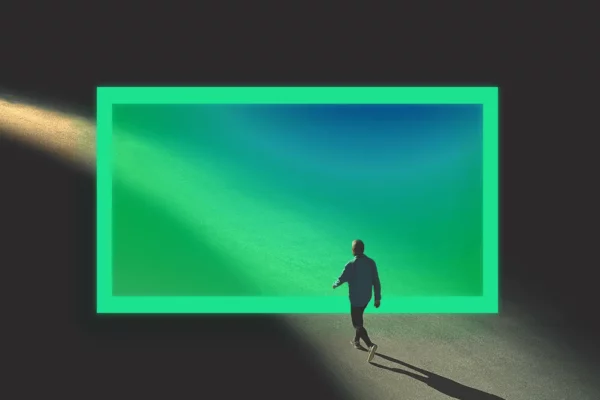
Table of Contents:
Transcript:
Dancing on my own
ALEX MORRIS: Across the street, I see a white van come to a stop. In big letters on the side, it says “Dial-A-Ride.” The van door opens, and an elderly woman with a walker slowly exits with a wave to the driver. I find myself feeling jealous. That’s the kind of service I want. And need. That night, I search “Dial-A-Ride” online. It’s a service operated by the city to provide transportation for the elderly and the disabled. I wonder, “Am I eligible?”
ROHAN GUNATILLAKE: Alex Morris has spent much of his life pretending. Prior to becoming a writer for WaitWhat’s business podcast Masters of Scale, he performed and taught improv comedy in London, putting on the guise of various absurd characters night after night. But his habit for hiding his true self started long before he ever stepped on a stage. In this week’s episode, Alex shares a story about his struggles living with a degenerative eye disease and the lengths to which he would go to pretend he didn’t need help.
In this series, we combine immersive first-person stories, breathtaking music, and mindfulness prompts so that we may see our lives reflected back to us in other people’s stories. And that can lead to improvements in our own inner lives.
From WaitWhat, this is Meditative Story. I’m Rohan, and I’ll be your guide.
The body relaxed. The body breathing. Your senses open. Your mind open. Meeting the world.
MORRIS: Shoes squeak against the polished floors. The ceilings are high and modern. I can smell everyone’s packed lunch. “You’re representing St. Ippolyts Primary School,” our teacher reminds us. We’re here at the O2 Arena to see the King Tutankhamun exhibit. London is exciting. I’m 10 years old and live in a small market town 20 minutes outside of the city. Everything here seems massive. Dangerous but also grown-up.
And I can’t enjoy any of it. My focus is on my hands, my feet. On how easy it is for me to get lost as we merge with a crowd of other schoolchildren. I desperately keep my eyes on the boy in front of me with the same school uniform, the same color tie. Navy blue and gold stripes. Navy blue and gold stripes. Navy blue and…
I head out of the bright entryway into the dimly lit exhibit. My world goes dark.
For as long as I can remember, I’ve had bad eyes. I’m completely blind at night. During the day I have no peripheral vision and severe short-sightedness. I see the whole world through a narrow box. At this point, almost no one outside of my family knows this. And that’s how I want to keep it. My dream is that no one can tell I’m struggling.
Inside the darkened exhibit, I can’t see a thing. Vague shapes pass through my field of vision. I hear my classmates “ooo” and “aaah” at what I assume is an impressive Egyptian tomb, and I find myself joining in. I pretend I can see.
I can never drop this performance. The thought of someone seeing that I need help is too embarrassing. I just want to be like everyone else. But here in the dark, surrounded by dozens of kids enjoying their big day in the city, I feel like no one. I feel alone.
Years later, I stand in the kitchen at a friend’s house, bobbing my head to the garage rock sound of The Strokes blaring in the next room. I’m hyper-aware of the crisp crumbs under my shoes, and I’m grateful I don’t have to clean up at the end of the night. I learn to hang out in here during house parties because the kitchens are always the brightest. It’s easier to pretend to be fine in here.
I sip on a luke-warm beer as my friend Ben approaches. His wide smile is infectious. “Let’s go dance with everyone,” he says. I’m hesitant. It’ll be dark in the living room. What if I trip? What if everyone realizes I can’t see?
Without a word, Ben takes my hands and puts them on his shoulders. I hold tight as he guides me down the hall, through the crowd, and onto the dance floor. He shows me my own little two-foot-by-two-foot imaginary box. I feel safe. I feel secure. And I dance. Just like any other teenager on any other night.
I can’t ever remember talking to Ben about my vision problems. We’re really close. He just knows, somehow. When we go to movies with friends, he wordlessly grabs my hand to lead me out of the darkened theater as the credits start to roll. I don’t even have to ask.
And because I don’t have to ask, I can keep pretending to everybody else. I can enjoy hanging out with friends. As long as Ben is around, I know I’ll get home ok.
One summer night, a group of us head to a bar in town. I’m standing towards the back of the group. Ben is up front, chatting away. Enjoying himself. Everyone heads inside, but the bouncer puts out his hand to block my entry. “You can’t come in wearing shorts, mate.”
“No shorts? This isn’t even a nice place,” I argue. He doesn’t budge. My friends disappear upstairs. They forget I’m back here. My phone is dead. What am I going to do?
I begin the trek home. I creep along the sides of buildings. Run my hand along the brick facades. I stand at a crosswalk for ages, listening for bikes and cars. It’s stressful. Dangerous. A truck can hit me at any moment. I’d never see it coming.
I hear a group of lads having a night out approach. I stop, take out my phone, and pretend to be looking at something intently. I hope they don’t notice how panicked I am. I’ve done this since childhood. Like in the King Tut exhibit, I do an impression of someone having a good time. The thought of asking anyone for help never even occurs to me.
They pass me by without a second thought. And I’m left alone again. Standing in the dark.
GUNATILLAKE: Take a pause here with me. Feeling into how Alex is feeling in this moment. How you are feeling about how Alex is feeling. Notice the difference.
MORRIS: I see everything when I’m on stage. The bright lights illuminate every inch of the wooden platform. Its distinct edges. The plastic folding chairs. This is a space where I can have fun. Where I can just be normal.
Secretly, for years, I’ve wanted to perform on stage. Stepping into a spotlight doesn’t feel scary. It’s when the light goes out that worries me. How will I get off stage in the dark? What if I fall and look like an idiot? The fear of that moment paralyzes me. But my desire to pursue performing overcomes my fear of looking foolish.
I move to London for university and decide to try out for an improv troupe. At the audition, I meet a girl named Sophia. She’s here studying abroad from America. She has a Californian tan, large brown eyes, and wears jeans ripped at the knee. I accidentally laugh too loudly at every joke she makes. We both get in the troupe.
We perform dozens of shows together on campus and above dingy pubs. Improv is all about giving yourself over to the moment and trying things. Sometimes it’s terrible, but it doesn’t matter. We watch each other fail a hundred times. For the first time in my life, that’s okay. Any sort of pretense about being cool is thrown out the window. You have to trust your scene partner. And as I continue to stumble, I learn to trust Sophia.
One night, we perform in front of a particularly stone-faced crowd who would clearly prefer to be watching some aggressive stand-up. They neglect to switch off their phone notifications, which ping loudly every two minutes. There’s barely a single chuckle, but we’re trying. As I wrap the final scene, the lights black out, and a familiar fear sets in. Those clearly defined edges of the stage are gone. Someone loudly orders a drink at the bar. I’m too scared to move. And then I feel someone grab me.
It’s Sophia. She sees I need help. She loops her arm under mine, and I feel how steady she is. She feels secure. Sophia turns me towards the side of the stage and helps me walk down the steps to ground level.
Within a few months, Sophia and I are dating. Most nights, we stay up until 4 a.m. talking, laughing at stupid online quizzes.
I tell her about my poor eyesight. She’s already seen me at my most vulnerable. There’s no point in acting cool about this. She understands. She’s gentle. She encourages me to tell other people too. “Nobody will judge you. Everyone will just help.”
No way. She may think that now, but she doesn’t know how much of a burden I’ll be.
A few weeks later, some friends invite us out to a bar. I don’t want to go, but Sophia, in the best way, insists. When we get there, she leads me by the hand to our table and gets us drinks. She finds ways for me to enjoy myself. And I do.
Just like Ben at the house party, Sophia doesn’t let me hide out where the lights are brightest. She guides me into the dark. “We’ll make it fun for you. It doesn’t matter what everybody else is doing. I’ll make sure that you feel comfortable.” With her help, I start to come out of my shell. I like not having to pretend all of the time.
I’m home for the summer after graduation. My parents ask to talk to me in the kitchen. We sit at the long wooden table that punishes you with splinters if you fidget too much. They’ve made a pot of tea. Something serious is happening.
They tell me there is a name for what’s going on with my eyes. It’s called retinitis pigmentosa or RP, and I was actually diagnosed with it when I was six. “Alexander, they said you would be fully blind by the time you were 12,” my dad says. “But that didn’t happen.” I have a form of RP that causes my eyes to deteriorate more slowly. I’ll likely be fully blind by my 40s.
The news hits me hard. My whole life, I just thought it would be this. Night blindness. No peripheral vision. But it’s going to get worse? Fully blind in my 40s? I’ve spent so long trying to hide this from people. Pretending nothing is wrong. But I won’t be able to hide that. My parents explain in more detail. My tea gets cold.
I could resent them from keeping this from me. But I look at the love and concern in their faces. I don’t hold anything against them. They wanted to give me time to just be a kid.
And, looking back, I can see how much they protected me. Always handled me with care. I’ve been wrapped in bubble wrap for 20 years. And I internalize that.
Even now as an adult, I bubble wrap myself. I avoid going to certain places. I isolate myself because that’s how I can stay safe. When I’m alone, no one has to take care of me.
GUNATILLAKE: Breathe with me here, recognizing that self-care matters, in all its forms. Sometimes connection is wise action, sometimes it’s disconnection.
MORRIS: Four years later, I’m standing at a bus stop in Los Angeles. The bus isn’t coming. Since moving to LA with Sophia, now my wife, I’ve learned this is common. It’s a driving city. But because of my eyes, I can’t drive. I check the time. I have tickets for a basketball game that starts any minute. I swear under my breath, feeling helpless.
In London I was able to get places by walking or taking the train. But here I’m stranded. Every time I leave the house I’m reminded of my limitations. I have Sophia, but she has her own responsibilities. Going out is a challenge I largely avoid. In this huge, new city my world has never felt so small.
Across the street, I see a white van come to a stop. In big letters on the side, it says “Dial-A-Ride.” The van door opens and an elderly woman with a walker slowly exits with a wave to the driver. I find myself feeling jealous. That’s the kind of service I want. And need.
That night, I search “Dial-A-Ride” online. It’s a service operated by the city to provide transportation for the elderly and the disabled. I wonder, “Am I eligible?”
And I catch myself. If I do this, if I apply for this service, it will be the first time I identify as disabled. The first time I stop pretending. The first time I proactively ask for help.
I think back to the years I spent worrying that people would find out. All the parties I missed. All the loneliness I felt. I think about the conversations I’ve had with Sophia and the small ways in which I’ve allowed myself to be vulnerable. To lift some of this weight off my shoulders.
I decide, “Yes. I have partial blindness. There are things I cannot do on my own. But I deserve to live a full life. This service is for people like me, and I’m going to use it.”
Standing by the front window of our apartment, I see the “Dial-A-Ride” van pull up to the curb. It’s bigger than I remember. And I now see the words “Senior and Disabled” emblazoned on the side. Not exactly subtle.
But I remind myself not to feel embarrassed.
I step out my front door and walk three steps before I see the van driver lowering the wheelchair ramp. I panic. I remember that, from the outside, I look as healthy as any other man in his 20s. I don’t use a cane even though I could. My disability is invisible. Will they think I’m lying? That I’m taking advantage of this service?
Without thinking, I start dragging my right leg a little as I approach. And I immediately feel terrible. I’m so consumed with proving I’m not faking a disability that I fake a disability.
The van driver nods and smiles. She doesn’t ask me about my leg or my eyes. She’s not here to judge. She’s just here to help.
Inside the van, I’m the youngest passenger by about 50 years. I’m also the least confident. My elder seatmates don’t hesitate to ask for help. They ask the driver to slow down, to give them directions, to help them out of the van. Anything. They know their limitations, but they still have things they want to do. They’re part of a community. A network of people that are there to help each other.
This is still new for me. I’m going to make mistakes, and I’m going to stumble as I get more comfortable asking for help. But by signing up to use this bus, I’m, for the first time, making my world bigger instead of smaller.
Excited shouts echo around the entryway. My shoes scuff against the cement floor as I push my way through a teeming crowd of strangers. I’m in an arena in downtown LA about to see one of my favorite musicians perform, Kendrick Lamar. And I’m here by myself.
This is something I never would have done years ago and, if I’m honest, I’ve been nervous about it all day. But I’m here. Now I just need to find my seat. As I ascend the ramp into the darkened interior of the arena, I watch the details of the room fade into blackness, and quickly glance around until I see what I need: The usher.
“Hi,” I say to her. “I’m partially-sighted. Can you help me get to my seat?” She hardly gives me a glance before saying, “Sure.” Like it’s no problem at all.
With my hand on the shoulder of the usher, I know that everyone can see me, see that I need help. But for the first time I don’t care. This is saving me precious minutes of anxious stumbling and trying to bluff my way through the darkened aisles. I don’t have Ben here. Or Sophia. It’s just me. If I want to enjoy myself, I’m going to have to be honest and vulnerable.
Once at my seat, I have a little area all to myself. I put my anxiety aside and dance. I scream the lyrics along with the faceless crowd surrounding me. We react to each opening chord of every song like it’s the first and last night of our collective lives. I have so much fun. It’s one of the best nights I’ve had in years. My experience may not look like everyone else’s, but that’s ok. This is my own way of doing things. And it’s just as satisfying.
Sometimes we pretend things aren’t hard for us because we want to fit in. We’re worried about being embarrassed, or being a burden. We just want to be like everyone else. But really, pretending just isolates us from other people and forces us to carry a weight all on our own. When we ask for help, whether through a service or just a hand on someone’s shoulder, we open ourselves up to a network of family, friends, and strangers who are ready to do what they can. To help us experience the world in the way we’ve always wanted and, finally, not feel so alone.
Rohan’s closing meditation
GUNATILLAKE: Thank you Alex. So much wisdom in your story.
If you remember, it was getting into improv on stage that really opened things up for Alex. So we’ll start our closing meditation together with an improv-inspired relaxation practice.
We’ll start by becoming aware of your face. Saying yes to the sensations you feel there. And noticing what details are here to be noticed.
Becoming aware of your hands. Saying yes as they soften. And noticing any energy or vibrations that are present within them.
Becoming aware of our belly. Saying yes as it breathes. And noticing its rhythms.
Becoming aware of your smile. Saying yes as it softens areas of remaining tension across your body. And noticing its magic.
Our awareness. A spotlight, a spotlight of attention providing what we need to move.
The spotlight of awareness can make the hitherto invisible visible, the hitherto unseen seen.
Alex deciding to open up to, to allow into his life the label of being disabled made his world bigger. Doing so required a lot of courage, a lot of heart. So that’s where we’ll go next.
Now with our body soft, let’s turn to quiet, silence even, inviting our being to be calm, for the spotlight to light only the bare stage.
Breathing with me, let’s place our awareness into the center of our chest, into the heart region. Resting our awareness here ever so delicately. With the softest of invitations for the heart to emerge. We invite, we allow the sensations of the heart and the heartbeat to arise into awareness.
It may seem to have an unfamiliar rhythm, but that’s fine, just know what you can know of the heart and its movements, the heart and its influence as it appears here in the center of the body.
For me, I can feel it but it’s a bit fuzzy, clunky even, jumpy, that’s just how it is. I am aware of it all the same, just as it is. Knowing the heart as it does heart things.
If for whatever reason, the awareness just isn’t here today to know the heart sensations as they are, that’s ok. Feel free to place a hand on your chest as scaffolding, feeling into the heart like that.
Alex’s story is in many ways a story about vulnerability of the body, of the heart. So we mirror that by knowing the sensations of our own heart, by knowing the vulnerability here in our own heart.
Knowing that so many people around the world around us live with disability, often hidden. Yet another reminder to be light with our assumptions.
There is an old story from way back in the mindfulness tradition. A man was carrying water back from a well, using one of those long poles on his back with a large wooden bucket at each end. He saw a wise man on the road and said hi, paying his respects, and asked for some guidance in his life.
“Drop it,” said the wise man, pointing to one of the buckets, and he dropped it to the ground.
The wise man then pointed to the other bucket and said “Drop it,” and the man carrying water then dropped that one to the ground too. Water spilling everywhere. Then the wise man pointed to the man himself and said “Drop it.” And it all fell away, and he was finally free.
I love that story for so many reasons.
And using Alex’s story as a guide, it reminds me of the freedom that comes when we no longer have to pretend. I also find it challenging — every time I think of it — which over the last fifteen years is probably weekly. What am I holding that I don’t need to? That I don’t even realize that I’m holding?
To finish off, let’s go back to the heart. Dropping into silence, and with our hands on our heart, or just our bare attention there, we tune back in.
In time, just saying the word heart together with the intention to place our awareness there can bring it to the foreground. (That’s a skill worth learning by the way.)
Dropping our awareness into the heart, the area around the heart, as if it’s the easiest thing in the world.
Alex’s story closes with him dancing at a Kendrick Lamar concert, who’s touring his recent album. Alex is dancing free. So with our awareness soft and settled on the heart, or on the body, or on the breath, it’s up to you.
Visualize if you can Alex caught up in the wave of the music, the wave of the community, the wave of the freedom he feels in that moment.
And with the awareness staying with the heart, the body, the breath, bring to mind a time when you felt that free.
Giving yourself permission to feel like you feel in the memory. Making the past present. Making the past so present that it’s more present than past.
Thank you Alex for reminding me, for reminding us of the freedom of not having to pretend anymore.
Thank you Kendrick.
And thank you.
Go well.
We’d love to hear your personal reflections from Alex’s episode. How did you relate to his story? You can find us on all your social media platforms through our handle @meditativestory. Or you can email us at: [email protected].

